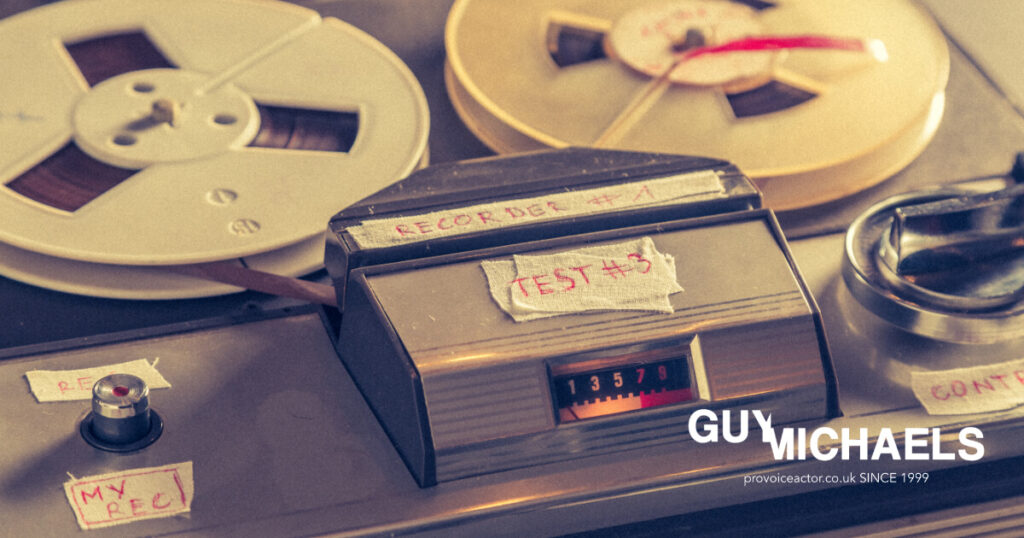A Thriving Industry with a Promising Future
These days we hear professional voices throughout our daily lives, in everything from eLearning courses to audioguides and public announcements to meticulously scripted commercials or heartfelt narrations in documentaries. In line with other countries, the UK voiceover industry continues to expand year on year. This article explores the industry’s current state, its evolution over the past 30 years, and what looks to be a very promising future.
From Traditional Studios to Home Setups: 30 Years of Development
Three decades ago, the UK voiceover landscape looked notably different. Recording studios were the central hubs, requiring physical presence for auditions and recordings. Technological limitations (connectivity and media) added complexity to the production process. However, the foundations of the UK’s strong reputation in recorded media were already in place and ready to develop and welcome new voices.
As a voiceover artist in my third decade of work I’ve witnessed every aspect of the way we work changing and in most cases, this has been for the best.

The advent of the internet and subsequent advances in recording technology revolutionised the industry. High-quality ‘home’ or project studios became viable, democratising the field and opening doors for a new wave of UK voice actors. This shift empowered voice talent to offer greater flexibility, faster turnaround, and connect with global clients from the comfort of their homes.
The Current State of UK Voiceover
Today, the demand for skilled UK voice over artists is vast. While commercials on TV, Radio and across social media are mainstays, there’s a surge in demand from sectors like corporate e-learning, audiobooks, video games, and animation. The industry has embraced remote collaboration and production, making geographical boundaries less of a constraint.
The UK’s strength lies in its pool of diverse voice talent. Regional accents add authenticity valued by clients worldwide. The rise of online resources has made VO training more accessible, allowing aspiring voice actors to browse a wide range of tutorials and tips to improve their craft, further enriching the field.
While technology like remote recording has been transformative, the rise of AI-generated voices presents a complex factor for the industry’s future.
The US influence
As with TV and film, there’s no denying the overpowering influence from the United States’ voiceover industry.
In my opinion this includes the good and the not-so-good.
Starting with the good, it’s encouraging to see that British actors and voice actors alike participate in ongoing training and most voices I work with incorporate some element of CPD into their schedule. This could be working on improving their technical studio skills, perfecting an accent or learning new marketing strategies for their voiceover business. Without a doubt this shift towards learning on the job has been influenced by US voices and the industry in general. I’m thankful for that.
To touch on the not-so-good I must mention what to me seems an over-valuation of awards ceremonies and red-carpet events. The UK industry training bodies etc have straight up duplicated the American way. Whilst, I won’t categorically dismiss the value, I must state that no media production company or client I have ever spoken to on the topic says that they are in any way influenced by the terms ‘award winning’ or ‘award nominated’ when casting their chosen voice.

Factors Fuelling Industry Growth
Globalisation is key to the UK voiceover industry’s development. Businesses seek localised content, often specifically requiring UK-accented voices. The booming audiobook and podcast markets further highlight the importance of skilled audio storytelling.
Technological advancements and the prevalence of home studios have democratised the field and fostered a wider pool of diverse voices across the UK.
A changing voice
If you ever come across a British voiceover artist on a recording from the 80s or even 90s, you’ll predominantly hear a sound which feels like the tail end of the BBC newsreader style from even further back in time. Yes of course, regional accents were used from time to time but they were rare. Most of the time you’d hear an RP accent, a homogenised poshness of British RP.
Thankfully, the voices we hear today are far more relatable and diverse, cast from up and down the land. The result is often a more natural, conversational style read coming from an approachable and recognisable voice. As a voice artist today, it’s normal to approach most projects as ‘pull rather than push’ and to avoid the broadcast sound of old.
Challenges Facing the Market
The globalised voice over market means British voice artists face increased competition from other English-speaking countries. Highlighting the unique strengths of British voices is essential, from the refined tones of a British male or female voiceover artist to the diverse range of accents found across the UK. Additionally, the lack of rate standardisation can lead to pay disparities, underscoring the need for discussions about fair compensation. The potential impact of AI voices also raises concerns about certain sectors of the industry.
The UK Voiceover Industry: Looking Forward
The UK voiceover industry appears poised for continued growth across existing and emerging sectors. Technological advancements will undoubtedly further shape collaboration and production methods.
Crucially, the enduring demand for human voices with skill and nuance cannot be overstated. Voice artists who possess versatility, adaptability, and a commitment to their craft will continue to thrive.
Conclusion
From its strong roots to its technologically-enhanced present, the UK voiceover industry holds a prominent position on a global stage. It stands out due to its exceptional talent, professionalism, and the distinct appeal of the British voice. The industry’s history of adapting to change bodes well for its continued success in the years to come. With a rich heritage and a promising future, the UK is poised to remain a powerhouse in the world of voiceovers.
Let’s connect on LinkedIn
